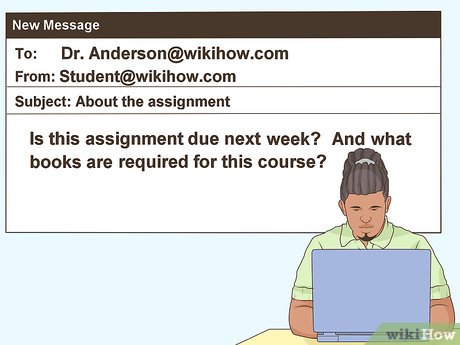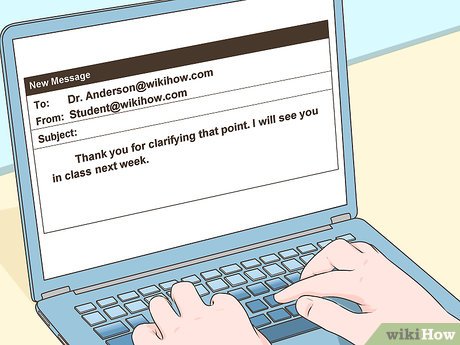How to Communicate With Your Professor
Part 1 of 3:
Planning Your Communication
-
 Remember that professors are there to help you. Approach your professor as a resource rather than an authority figure. They do better as teachers in the eyes of the school when you do well as a student. That is why professors open their offices to students.
Remember that professors are there to help you. Approach your professor as a resource rather than an authority figure. They do better as teachers in the eyes of the school when you do well as a student. That is why professors open their offices to students.- Most professors at the college level are passionate about their subject. They want students to understand and succeed.
-
 Make sure your professor is the right person to contact. Large lecture style classes might have teachers assistants (TAs) assigned to them to help students with certain subjects.
Make sure your professor is the right person to contact. Large lecture style classes might have teachers assistants (TAs) assigned to them to help students with certain subjects.- If you need clarification on dates and times, a TA might be able to help you much faster than your professor can.
- TAs may have taken this course before, or might be studying the subject being taught. Check with your TA to see if they can meet with you to help clarify general concepts about the subject.
- If you have questions that relate to the school but not to a particular class, your professor might not have the answer. Direct questions like "How do I check my grades?" or "How do I add and drop classes?" to your school's student services department.
-
 Double check your syllabus. The syllabus generally includes a basic course outline, dates for assignments and exams, reading lists, and class policies. Look over your syllabus to see if you can find the answer to your question.
Double check your syllabus. The syllabus generally includes a basic course outline, dates for assignments and exams, reading lists, and class policies. Look over your syllabus to see if you can find the answer to your question.- If your school uses a tool like Blackboard or Moodle, see if there is a calendar listed for your course that has assignment dates and readings listed.
- Check with a classmate or the TA before going to your professor with questions that are not about understanding course content.
-
 Decide on a communication method. The type of question you have can help you choose how you approach your professor. Ask simple questions with short responses through email. If a question involves information about grades or a longer answer, choose to meet in person.
Decide on a communication method. The type of question you have can help you choose how you approach your professor. Ask simple questions with short responses through email. If a question involves information about grades or a longer answer, choose to meet in person.- E-mail your professor for questions that involve confirming dates and times or asking for verification. Ask 'Is this assignment due next week?' and 'What books are required for this course?' via email.
- Meet your professor in person for questions like 'What is my grade on this assignment?' or 'Why did I receive this grade?' If there are class materials such as readings you want to discuss with your professor, do so in person.
- Visit your professor during their office hours or set up a meeting with them in advance. If you do not know your professor's office hours, or if you want to set up a meeting, email your professor to confirm.
- Be conscientious of your professor's requests. If they state they prefer only email or only office visits, show them respect by following their wishes.
-
 Review what you are going to say. If you are writing an email, this includes proofreading to make sure your intent is clear. If you are meeting in person, this includes planning out what you need to say to your professor.[1]
Review what you are going to say. If you are writing an email, this includes proofreading to make sure your intent is clear. If you are meeting in person, this includes planning out what you need to say to your professor.[1]- Bring a notecard or outline with the topics that you need to cover. This helps ensure that you do not forget anything.
- If you are very nervous, practicing your talking points in front of a mirror or with a peer may help.
- If you're asking for help with a subject, remember that your professor is there to make sure you understand. Approach them with clear questions, and be open to a discussion.
- Understand that if you are asking a favor, like an extension for a deadline or a letter of recommendation, your professor has the right to say no. Be prepared to approach multiple professors for letters of recommendation.
-
 Gather your materials. Keep your notecard with your questions handy when you speak with your professor, and bring any other materials relevant to your question.
Gather your materials. Keep your notecard with your questions handy when you speak with your professor, and bring any other materials relevant to your question.- If you are asking about an assignment or exam, bring a copy with you.
- If you are asking a professor to review a paper or assignment, send it to them in advance. Try to give your professor at least a week to review your work before meeting with them.
- Always have your syllabus ready when meeting with your professor, and familiarize yourself with its contents before you meet.
- If you have a question about course materials, bring the texts with you so that they are easy to reference.
Part 2 of 3:
Talking To Your Professor
-
 Write a respectful email. It is alright to have a short email, but keep it formal. Do not use any slang and make sure there is a salutation and closing.
Write a respectful email. It is alright to have a short email, but keep it formal. Do not use any slang and make sure there is a salutation and closing.- Use the right title. A doctor is a professor with a PhD. Address doctors as 'Dr. [Last Name]', and other professors as 'Professor [Last Name]' unless otherwise instructed. If you are unsure, use Professor as an all-purpose title.
- Introduce yourself in your email. Your professor probably has multiple classes and many students. Starting off with 'This is John Doe from your Biology 101 course' lets them know both who you are and the applicable course for your question.
- Keep it short. Professors generally receive many e-mails throughout the day. Keeping your text brief enables your professor to read and respond to you faster.
- Proofread your email to make sure there are no typos, and that your question is clear and concise.
-
 Ask questions at the end of class. You may feel more comfortable around your professor after you've just spent time with them. If you have a quick question or one related to material covered that day, approaching your professor immediately after class is often acceptable.
Ask questions at the end of class. You may feel more comfortable around your professor after you've just spent time with them. If you have a quick question or one related to material covered that day, approaching your professor immediately after class is often acceptable.- If there is a mob of students already waiting to talk to the professor, check your syllabus to see when you can come in for office hours.
-
 Meet your professor in-office. Meeting with your professor in-office is a good time to build a positive relationship and demonstrate that you are working hard in class. Do this by showing that you are familiar with the material and asking specific questions about where you want help.[2]
Meet your professor in-office. Meeting with your professor in-office is a good time to build a positive relationship and demonstrate that you are working hard in class. Do this by showing that you are familiar with the material and asking specific questions about where you want help.[2]- The best time to meet with your professor is during their designated office hours, which are usually listed in the course syllabus.
- If you have conflicts with the office hour times, you should schedule a meeting with your professor via e-mail.
- Arrive punctually to scheduled appointments. It is inconsiderate of your professor's time if you do not show up for your scheduled appointment, since they may be waiting for you after postponing other work. If you can't make your appointment or are going to be late, call your professor or send them a quick email to let them know.
- Keep things on track. You know what you want from a meeting better than your professor. If you start getting off-track, redirect the conversation back to your original questions by saying 'I think I still need help with this aspect of the material.'
- Do not be afraid to take notes when you meet. Make sure you have a pen and paper to jot down conversation points before you go in.
- Meet with your professor regularly to stay on track and ensure you are making good progress in class. Try to meet early in the semester, after the first exam, at midterms, and before finals.[3]
Part 3 of 3:
Following Up
-
 Send a thank you. If your professor responds to your email, send them a short thank you note for their time and effort. 'Thank you for clarifying that point. I will see you in class next week' is a good way to acknowledge that they answered your question.[4]
Send a thank you. If your professor responds to your email, send them a short thank you note for their time and effort. 'Thank you for clarifying that point. I will see you in class next week' is a good way to acknowledge that they answered your question.[4]- If you met with your professor in-person, you may still want to send a thank you email, especially if they took extra time to help you with a concept or worked with you over several meetings.
-
 Decide whether you need more information. Look at your talking points to see if your professor answered all of your questions. If they did not, email them to follow up.
Decide whether you need more information. Look at your talking points to see if your professor answered all of your questions. If they did not, email them to follow up.- Briefly explain that you still have some questions about the subjects you were discussing.
- Request clarification by stating your unanswered questions in a new way. If you did not get an answer to 'When is the exam?' try asking 'What is the date and time for the exam?'
- If there are large areas of information you did not cover during your meeting, request to schedule a second meeting. Let your professor know what specific matters you still want to discuss.
- If you are working on a continued goal or long-term improvement in the course, ask to set up weekly meetings to check in with your professor.[5]
-
 Reach out to a peer. If your professor was unable to answer your question and you do not want to meet with them again, check with your peers to see if they have the information you need.
Reach out to a peer. If your professor was unable to answer your question and you do not want to meet with them again, check with your peers to see if they have the information you need.- If you are looking for feedback on an exam or assignment, participate in a peer review. Exchange assignments with a classmate and mutually review each other's work.
- If your school has a writing center, check to see if they offer paper review services.
- If your class has a teacher's assistant or graduate student assigned to it, schedule a meeting with them. TAs are there to help support the students as well as the professor. Meet with them to see if you can get a better understanding of the information you need.
-
 Participate in class. No matter what you asked your professor, one of the best ways to communicate with them and show that you have taken their words to heart is to be active in class.
Participate in class. No matter what you asked your professor, one of the best ways to communicate with them and show that you have taken their words to heart is to be active in class.- Ask questions during class time to make sure you continue to understand the material.
- Pay attention to due dates and assignment requirements to ensure you get required work in by its deadline.
Share by
Micah Soto
Update 24 March 2020












